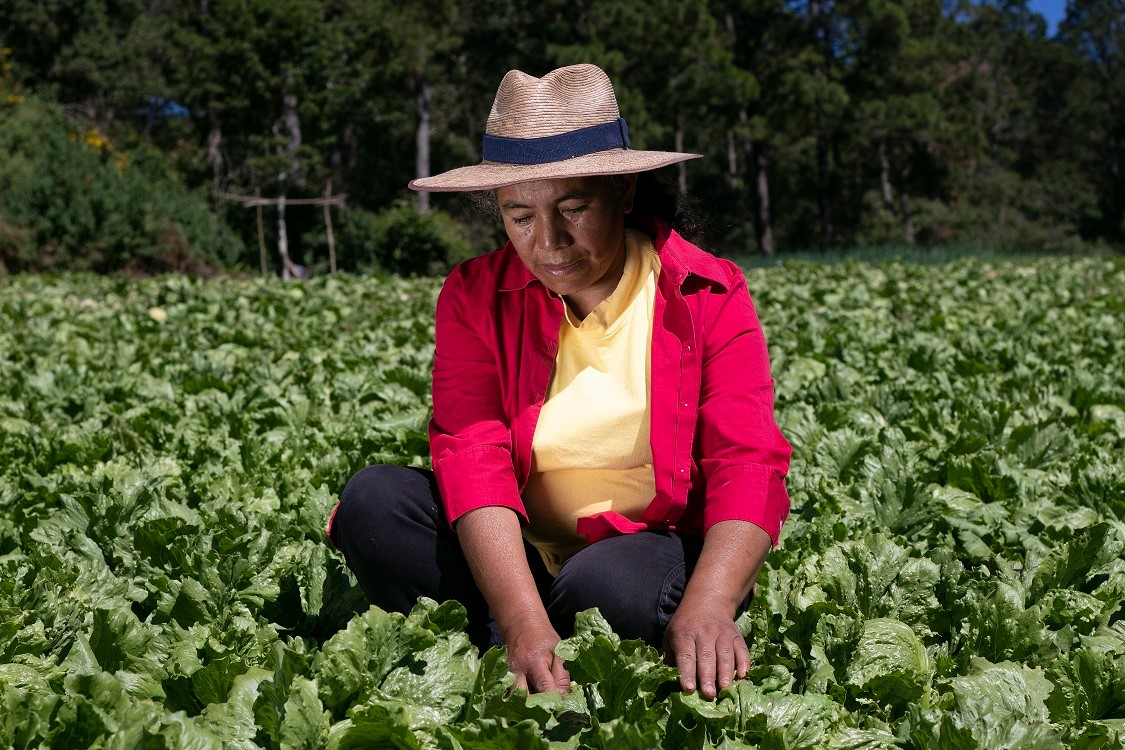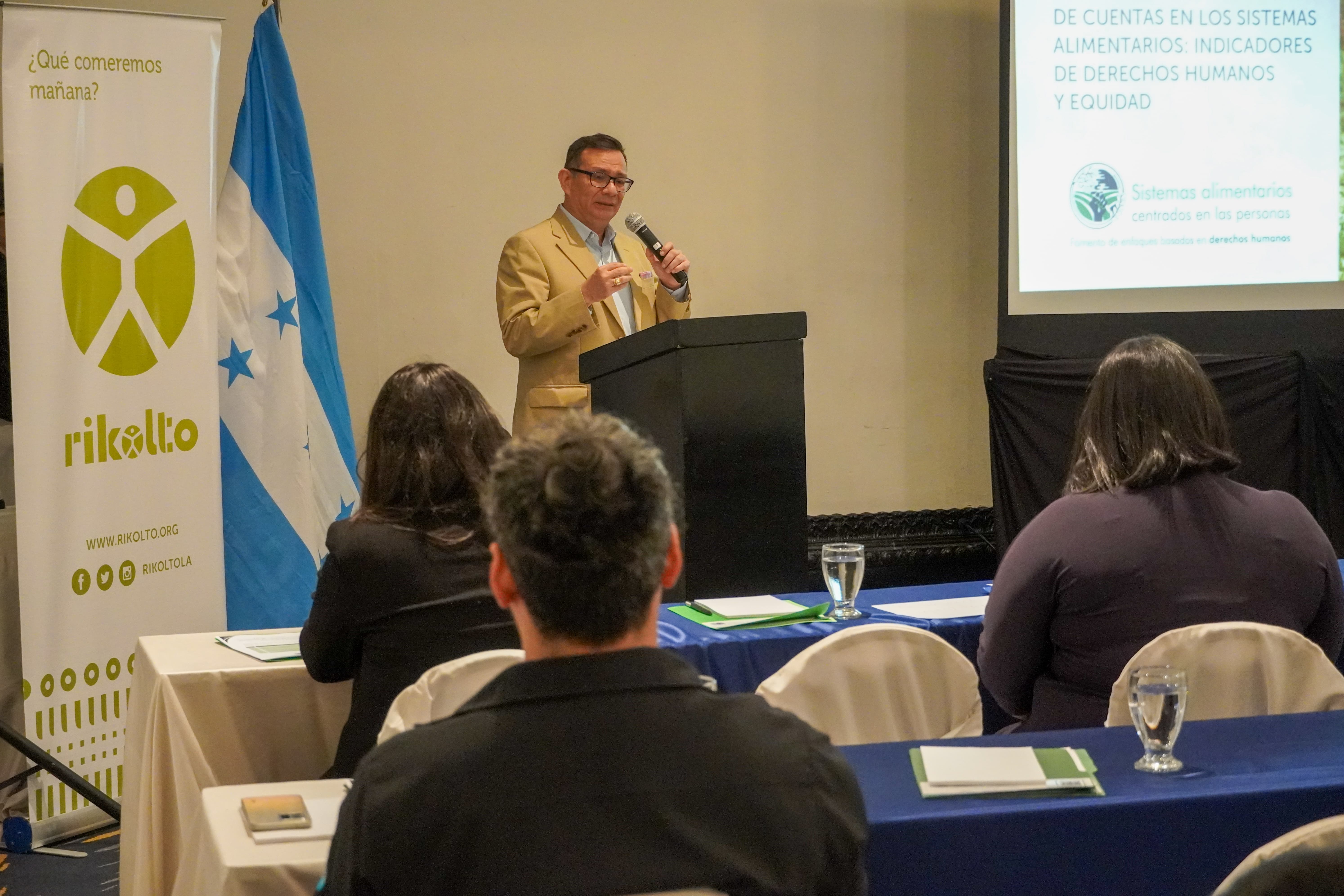
In Honduras, food insecurity remains a pressing challenge, with one in five living in poverty. In rural areas, this issue is further exacerbated by unequal opportunities, limited access to basic services, and a lack of decent employment, all of which hinder people’s ability to secure a nutritious diet. To address this, we focus on building capacities that bridge the gap between theory and practice, empowering communities to exercise their right to food through healthy and affordable diets.
Honduras is particularly vulnerable to climate change, as parts of the country lie within the Dry Corridor, a tropical dry forest region that stretches across Central America’s Pacific Coast. This area is prone to irregular rainfall patterns, prolonged droughts, and extreme weather events. Honduras’s geographic location also exposes it to hurricanes and flooding, further compounding its climate risks, severely disrupting local food systems and agricultural productivity. Food insecurity is deeply intertwined with a range of social factors, limiting opportunities for improving living conditions.
In 2024, the undernourishment rate in Honduras stood at 20.4%, while poverty affected 63% of the rural population, according to FAO. In these rural areas, food insecurity is exacerbated by unequal opportunities, restricted access to basic services, and limited prospects for decent employment. These challenges make it particularly difficult for vulnerable groups, such as farmers, women, youth, people with disabilities, and others, to access nutritious, sustainable, and healthy food.
Local food systems and a healthy diet are interconnected in many ways. They help promote local production and access to fresh, healthy food within a community, and this can have a positive impact on the health of its members and environmental sustainability. In addition, these systems can help preserve cultural traditions and encourage community participation in food decision-making, especially in households and schools.
The People-Centred Food Systems (PCFSy) project aims to integrate human rights frameworks and instruments with public policy to strengthen food systems, taking as a reference the UN Declaration on the Rights of Peasants and Other People Working in Rural Areas (UNDROP). The goal is to transform this right from theory to practice, such as through the promotion of healthy, nutritious, and balanced diets. The project is implemented with vulnerable groups (farmers, women, young people, people with disabilities, and others), government actors, and local civil society organisations in Ethiopia, Honduras, Cambodia and Uganda, through a consortium made up of Columbia University, Alliance of Bioversity International-CIAT, the International Institute for Rural Reconstruction and Rikolto. In Honduras, Rikolto is in the lead. The project is funded by the Swiss Agency for Development and Cooperation.
We organised training and workshop sessions to promote knowledge and capacity building on nutrition and sustainable food practices while encouraging cultural preservation and community participation. The objective is that governments effectively integrate and implement human rights and equity into food-related plans, policies, and legislations at sub-national and national levels. This phase has a special focus on the Lenca communities within the Mancomunidad de Municipalidades de Centro de La Paz (MAMCEPAZ), as a result of a petition made by government authorities at both the national and local levels to address the significant food insecurity and nutritional challenges in the region.

The Dry Corridor, where MAMCEPAZ is located, faces high levels of food insecurity and major barriers to accessing nutritious food, leading to considerable difficulties for Lenca communities in ensuring proper nutrition for their families. Addressing their unique social and cultural needs is crucial for empowering them and ensuring their inclusion in development initiatives.
By focusing on Lenca women in trainings, we aim to promote greater equity and provide them with the tools and opportunities necessary for their personal and community growth. “As heads of their households, Lenca women decide what their family consumes and purchases. Their choices directly impact the family's nutrition, budget, and overall well-being. Their involvement is essential for the family’s day-to-day functioning, as well as to transfer knowledge and replicate food practices in the region,” explains Raúl Pinel, project coordinator, Honduras.

Through advocacy meetings and dialogues, we enhance the capacity of vulnerable groups and government actors to understand, value and use the United Nations Declaration on the Rights of Peasants and Other People Working in Rural Areas (UNDROP) articles in ways that benefit rural and peri-urban food producers and affected populations through increased access to information. Our primary focus is the new Human Rights policy in Honduras, which includes a chapter on the Right to Food, aimed at driving policy impact and ensuring accountability.
We participate in the design and validation of human rights and equity indicators and accountability mechanisms specifically adapted to existing or new national monitoring and evaluation (M&E) systems.
In 2024, a food assessment was conducted with 125 community leaders, in collaboration with UTSAN, OBSAN and CONADEH. The study found that 47% of the participants were unable to consume three meals a day. Also, more than 60% did not eat the necessary quantity of fruit, and 70% did not eat the necessary quantity of vegetables. The full results are available here.
This data nurtured a community training plan rolled out later that year to promote the right to adequate food - including topics such as food security based on local resources, dietary diversity and sustainable production.
Partnerships were crucial for capacity building and transferring knowledge to stakeholders and government actors. In 2023, we formed partnerships with 350 government officials, 242 leaders of NGOs or Alliance, 182 farmer leaders, 139 academy members and researchers, and 184 community members; in 2024, 173 government officials and staff, 309 leaders of NGOS or Alliance, 59 farmer leaders, 136 academy members and researchers, and 159 community members. For example, the National Office of the Commissioner for Human Rights in Honduras (CONADEH), through the Promotion and Education Management, played a key role in training beneficiaries on rights and equity. Additionally, the Ministry of Agriculture, through the Technical Unit for Food Security and Nutrition, has been involved in policy dialogues and discussions, alongside the Observatory for Food Security and Nutrition. We have formed a small but committed group of allies focused on Food Security and Nutrition (FSN), with Rikolto coordinating and serving as the central link that unites all stakeholders. We actively support various initiatives to enhance knowledge transfer, build capacity, and drive impactful changes in policy.
These capacity building initiatives touched critical topics, such as nutrition, labour rights, children’s rights, women’s rights, and gender equality. In 2023, these activities reached communities in 9 out of 18 Honduras departments. We collaborated with overall 1097 people, including 593 women and 406 young people. In 2024, our capacity building sessions reached communities in 6 out of 18 Honduras departments, collaborating with overall 836 people, including 583 women and 410 young people.
By partnering with government actors, and through advocacy meetings and dialogues, we supported the consultative drafting of national legal and policy frameworks that contribute to the implementation of country-specific UNDROP roadmaps.
Starting in 2022, Rikolto reinforced partnerships with the Technical Unit for Food and Nutrition Security (UTSAN), the University Observatory OBSAN, and the National Human Rights Commission of Honduras (CONADEH). By 2023, five dialogue sessions were held with rights-holders, in which more than 196 persons participated. The conversations were guided to analyse the Honduran Agri-Food Policy (PESAH) and the National Policy and Strategy for Food and Nutrition Security (PyENSAN) to assess its alignment with the UN Declaration on the Rights of Peasants and Other People Working in Rural Areas (UNDROP).
In 2024, Rikolto and the Honduran Secretariat for Human Rights (SEDH) started a collaboration and facilitated six more dialogue processes focusing on reviewing the new National Human Rights Policy. As a result, the right to adequate food was explicitly included in the new National Human Rights Policy; a significant achievement supported by the development of practical indicators to assess the progress in the implementation of the policy.
The new National Human Rights Policy is designed to establish a comprehensive framework that connects and integrates all sectors, creating a cohesive approach to human rights across the entire government. The policy’s integrated monitoring system will provide clear oversight on whether ministries and government institutions are fulfilling their commitments and obligations as outlined in the policy. As a result of the collaboration with SEDH, Rikolto supported the validation of the indicators that can be used to implement the UNDROP, PESAH and PyENSAN within the new Human Rights Policy.

It is important to note that while the impact of policy changes cannot be fully measured within the short lifetime of a project—since such changes usually take more than 10 years—the project is laying the groundwork to improve existing policies or contribute to the new Human Rights Policy. These efforts aim to establish new methods for monitoring both technical and financial progress, contributing to a more effective and sustainable approach to food security and the right to food.
Food is more than what ends up on our plates - it is a fundamental human right. Policymakers in other contexts can look to the Honduran case for lessons: realising this right requires cross-sectoral efforts that span agriculture, health, education, environment, and governance. That is why Rikolto focuses on collective action, trying to acknowledge the leadership of local communities and institutions - so that adequate food is no longer a privilege, but a right that protects the dignity of all.
